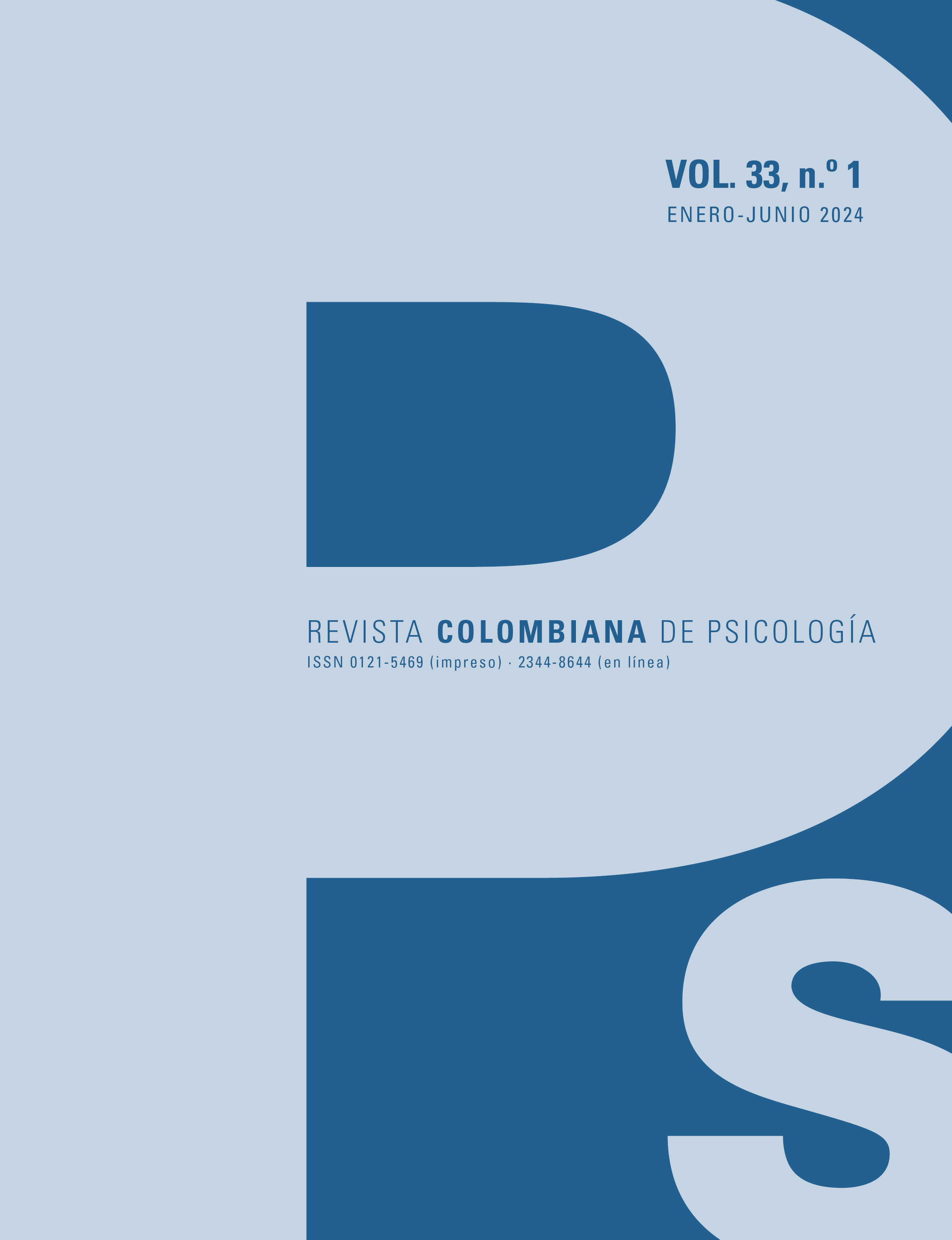On the Positive Side of WorkFamily Interaction: Development and Validation of the Short Work-Family Enrichment Scale (SP-WFES-6) in Argentina
El lado positivo de la interacción trabajo-familia: desarrollo y validación de la Escala Breve de Enriquecimiento TrabajoFamilia (SP-WFES-6) en Argentina
DOI:
https://doi.org/10.15446/rcp.v33n1.101801Keywords:
Work-family enrichment, Job satisfaction, Burnout, Validation (en)enriquecimiento trabajo-familia, satisfacción laboral, burnout, validación (es)
Downloads
The purpose of this study was to develop and to, subsequently, validate a Spanish version of the Short Work-Family Enrichment Scale (sp-wfes-6). Using cross-sectional (n = 438) and multi-wave (n = 103) data from a sample of workers with different backgrounds, this paper conducted a thorough examination of the psychometric properties of the sp-wfes-6 in terms of its internal consistency, test-retest reliability, dimensionality, factor invariance, gender invariance, convergent validity, discriminant validity, and predictive validity. The results from the cfa revealed that the sp-wfes-6 comprised two factors and that this two-factor structure remained statistically invariant across gender and sample. Furthermore, both factors reported adequate levels of internal consistency, test-retest reliability, convergent validity, discriminant validity and predictive validity. Altogether, the findings of this study demonstrated that the spwfes-6 is a reliable and valid instrument to measure work-family enrichment in Argentina and, possibly, in other Spanish-speaking countries.
El propósito de este estudio fue desarrollar y, posteriormente, validar una versión en español de la Escala Breve de Enriquecimiento Trabajo-Familia (sp-wfes-6). Utilizando datos transversales (n = 438) y longitudinales (n = 103) de una muestra de trabajadores diversos, este artículo realizó un examen exhaustivo de las propiedades psicométricas de la sp-wfes-6 en términos de su consistencia interna, confiabilidad test-retest, dimensionalidad, invariancia factorial, invariancia de género, validez convergente, validez discriminante y validez predictiva. Los resultados del cfa revelaron que la sp-wfes-6 constaba de dos factores y que esta estructura bi-factorial se mantuvo estadísticamente invariable según el género y la muestra. Además, ambos factores reportaron niveles adecuados de consistencia interna, confiabilidad test-retest, validez convergente, validez discriminante y validez predictiva. En conjunto, los hallazgos de este estudio demostraron que la sp-wfes-6 es un instrumento confiable y válido para medir el enriquecimiento trabajo-familia en Argentina y, posiblemente, en otros países hispanoparlantes.
References
Beutell, N. J., & Greenhaus, J. H. (1983). Integration of home and nonhome roles: Women’s conflict and coping behavior. Journal of Applied Psychology, 68(1), 43-48. https://doi.org/10.1037/0021-9010.68.1.43
Byrne, B. M. (2001). Structural equation modeling: Perspectives on the present and the future. International Journal of Testing, 1(3-4), 327-334. https://doi.org/10.1080/15305058.2001.9669479
Byron, K. (2005). A meta-analytic review of work–family conflict and its antecedents. Journal of Vocational Behavior, 67(2), 169-198. https://doi.org/10.1016/j.jvb.2004.08.009
Carlson, D. S., Kacmar, K. M., & Williams, L. J. (2000). Construction and initial validation of a multidimensional measure of work–family conflict. Journal of Vocational Behavior, 56(2), 249-276. https://doi.org/10.1006/jvbe.1999.1713
Carlson, D. S., Kacmar, K. M., Wayne, J. H., & Grzywacz, J. G. (2006). Measuring the positive side of the work–family interface: Development and validation of a work–family enrichment scale. Journal of Vocational Behavior, 68(1), 131-164. https://doi.org/10.1016/j.jvb.2005.02.002
Carlson, D. S., Ferguson, M., Kacmar, K. M., Grzywacz, J. G., & Whitten, D. (2011). Pay it forward: The positive crossover effects of supervisor work-family enrichment. Journal of Management, 37(3), 770-789. https://doi.org/10.1177/0149206310363613
Carlson, D. S., Hunter, E. M., Ferguson, M., & Whitten, D. (2014). Work–family enrichment and satisfaction: Mediating processes and relative impact of originating and receiving domains. Journal of Management, 40(3), 845-865. https://doi.org/10.1177/0149206311414429
Carlson, D. S., Thompson, M. J., Crawford, W. S., & Kacmar, K. M. (2019). Spillover and crossover of work resources: A test of the positive flow of resources through work–family enrichment. Journal of Organizational Behavior, 40(6), 709-722. https://doi.org/10.1002/job.2363
Cheung, G., & Rensvold, R. (2002). Evaluating goodnessof-fit indexes for testing measurement invariance. Structural Equation Modeling, 9(2), 233-255. https://doi.org/10.1207/s15328007sem0902_5
DeVellis, R. (2012). Scale development: Theory and applications. Los Angeles: Sage.
Fornell, C., & Larcker, D. (1981). Evaluating structural equation models with unobservable variables and measurement error. Journal of Marketing Research, 18(1), 39-50. https://doi.org/10.1177/002224378101800104
Frone, M. R., Russell, M., & Cooper, M. L. (1992). Antecedents and outcomes of work-family conflict: testing a model of the work-family interface. Journal of Applied Psychology, 77(1), 65-78. https://doi.org/10.1037/0021-9010.77.1.65
Geurts, S. A., Taris, T. W., Kompier, M. A., Dikkers, J. S., Van Hooff, M. L., & Kinnunen, U. M. (2005). Work-home interaction from a work psychological perspective: Development and validation of a new questionnaire, the SWING. Work & Stress, 19(4), 319-339. https://doi.org/10.1080/02678370500410208
Gordon, J. R., Whelan-Berry, K. S., & Hamilton, E. A. (2007). The relationship among work-family conflict and enhancement, organizational work-family culture, and work outcomes for older working women. Journal of Occupational Health Psychology, 12(4), 350. https://doi.org/10.1037/1076-8998.12.4.350
Greenhaus, J. H., & Beutell, N. J. (1985). Sources of conflict between work and family roles. Academy of Management Review, 10(1), 76-88. https://doi.org/10.5465/amr.1985.4277352
Greenhaus, J. H., & Powell, G. N. (2003). When work and family collide: Deciding between competing role demands. Organizational Behavior and Human Decision Processes, 90(2), 291-303. https://doi.org/10.1016/s0749-5978(02)00519-8
Greenhaus, J. H., & Powell, G. N. (2006). When work and family are allies: A theory of work-family enrichment. Academy of Management Review, 31(1), 72-92. https://doi.org/10.5465/amr.2006.19379625
Haar, J., & Cordier, J. (2020). Testing the psychometric properties of the short work–family enrichment scale on underrepresented samples. International Journal of Selection and Assessment, 28(1), 112-116. https://doi.org/10.1111/ijsa.12268
Haines III, V. Y., Harvey, S., Durand, P., & Marchand, A. (2013). Core self‐evaluations, work–family conflict, and burnout. Journal of Marriage and Family, 75(3), 778-793. https://doi.org/10.1111/jomf.12026
Hair, J., Black, W., Babin, B., & Anderson, R. (2010). Multivariate data analysis: A global perspective. Upper Saddle River, NJ: Pearson Prentice Hall.
Hambleton, R. K., Merenda, P. F., & Spielberger, C. D. (2006). Adapting educational and psychological tests for cross-cultural assessment. Mahwah, NJ: Lawrence Erlbaum.
Herman, J. B., & Gyllstrom, K. K. (1977). Working Men and Women: Inter-and Intra-Role Conflict. Psychology of Women Quarterly, 1(4), 319-333. https://doi.org/10.1111/j.1471-6402.1977.tb00558.x
Hobfoll, S. E. (1989). Conservation of resources: a new attempt at conceptualizing stress. American Psychologist, 44(3), 513-524. https://doi.org/10.1037/0003-066x.44.3.513
Hobfoll, S. E. (2011). Conservation of resource caravans and engaged settings. Journal of Occupational and Organizational Psychology, 84(1), 116-122. https://doi.org/10.1111/j.2044-8325.2010.02016.x
Hubley, A. (2014). Discriminant validity. In A. Michalos (Ed.), Encyclopedia of quality of life and well-being research (pp. 1664-1667). Dordrecht: Springer. DOI: https://doi.org/10.1007/978-94-007-0753-5_751
Kacmar, K. M., Crawford, W. S., Carlson, D. S., Ferguson, M., & Whitten, D. (2014). A short and valid measure of work-family enrichment. Journal of Occupational Health Psychology, 19(1), 32-45. https://doi.org/10.1037/a0035123
Kalliath, P., Kalliath, T., & Chan, C. (2017). Work–family conflict, family satisfaction and employee well‐being: A comparative study of Australian and Indian social workers. Human Resource Management Journal, 27(3), 366-381. https://doi.org/10.1111/1748-8583.12143
Kline, R. B. (2010). Principles and practice of structural equation modeling. New York: Guilford
Lapierre, L. M., Li, Y., Kwan, H. K., Greenhaus, J. H., DiRenzo, M. S., & Shao, P. (2018). A meta‐analysis of the antecedents of work–family enrichment. Journal of Organizational Behavior, 39(4), 385-401. https://doi.org/10.1002/job.2234
Lazzaro-Salazar, M. (2019). Researchers as brokers: Reflections from a study of migrant physicians in Chile. The Social Science Journal, 56(4), 609-616. https://doi.org/10.1016/j.soscij.2018.09.006
Lim, D. H., Song, J. H., & Choi, M. (2012). Work–family interface: Effect of enrichment and conflict on job performance of Korean workers. Journal of Management & Organization, 18(3), 383-397. https://doi.org/10.5172/jmo.2012.18.3.383
Lu, L., & Kao, S. F. (2013). The reciprocal relations of pressure, work/family interference, and role satisfaction: Evidence from a longitudinal study in Taiwan. Human Resource Management, 52(3), 353-373. https://doi.org/10.1002/hrm.21532
Marks, S. R. (1977). Multiple roles and role strain: Some notes on human energy time and commitment. American Sociological Review, 42(6), 921-936. https://doi.org/10.2307/2094577
Maslach, C., & Jackson, S. E. (1981). Maslach Burnout Inventory: MBI. Palo Alto, CA: Consulting Psychologists Press. DOI: https://doi.org/10.1037/t05190-000
Matthews, R. A., Kath, L. M., & Barnes-Farrell, J. L. (2010). A short, valid, predictive measure of work–family conflict: Item selection and scale validation. Journal of Occupational Health Psychology, 15(1), 75-90. https://doi.org/10.1037/a0017443
Masuda, A. D., McNall, L. A., Allen, T. D., & Nicklin, J. M. (2012). Examining the constructs of work-tofamily enrichment and positive spillover. Journal of Vocational Behavior, 80(1), 197-210. https://doi.org/10.1016/j.jvb.2011.06.002
Nunnally, J. C. (1978). Psychometric theory. New York: McGraw-Hill.
O’Donnell, E., Berkman, L. F., Kelly, E., Hammer, L., Marden, J., & Buxton, O. M. (2019). Cardiometabolic risks associated with work-to-family conflict: Findings from the work family health network. Community, Work & Family, 22(2), 203-228. https://doi.org/10.1080/13668803.2018.1440193
Omar, A., Urteaga, F., & Salessi, S. (2015). Propiedades psicométricas de la Escala de Enriquecimiento Trabajo-Familia para la población argentina. Revista de Psicología, 24(2), 1-18. https://doi.org/10.5354/0719-0581.2015.37689
Piedmont, R. L., McCrae, R. R., Riemann, R., & Angleitner, A. (2000). On the invalidity of validity scales: Evidence from self-reports and observer ratings in volunteer samples. Journal of Personality and Social Psychology, 78(3), 582-593. https://doi.org/10.1037/0022-3514.78.3.582
Podsakoff, N. P. (2003). Common method biases in behavioral research: A critical review of the literature and recommended remedies. Journal of Applied Psychology, 88(5), 879-903. https://doi.org/10.1037/0021-9010.88.5.879
Powell, G. N., Greenhaus, J. H., Allen, T. D., & Johnson, R. E. (2019). Introduction to special topic forum: Advancing and expanding work-life theory from multiple perspectives. Academy of Management Review, 44(1), 54-71. https://doi.org/10.5465/amr.2018.0310
Pujol-Cols, L. J., & Dabos, G. E. (2019). Dispositional and situational factors at work: A validation of scales and examination of effects on job satisfaction. Academia Revista Latinoamericana de Administración, 33(1), 49-70. https://doi.org/10.1108/arla-12-2017-0355
Pujol-Cols, L. (2021). Development and validation of the Spanish Work-Family Conflict Scale (SP-WFCS): evidence from two independent samples in Argentina. Current Psychology, 40(9), 4189-4204. https://doi.org/10.1007/s12144-019-00544-y
Rogelberg, S. G., & Stanton, J. M. (2007). Introduction: Understanding and dealing with organizational survey nonresponse. Organizational Research Methods, 10(2), 195-209. https://doi.org/10.1177/1094428106294693
Shockley, K. M., & Singla, N. (2011). Reconsidering workfamily interactions and satisfaction: A meta-analysis. Journal of Management, 37(3), 861-886. https://doi.org/10.1177/0149206310394864
Thompson, E. R., & Phua, F. T. (2012). A brief index of affective job satisfaction. Group & Organization Management, 37(3), 275-307. https://doi.org/10.1177/1059601111434201
van Steenbergen, E. F., Kluwer, E. S., & Karney, B. R. (2014). Work–family enrichment, work–family conflict, and marital satisfaction: A dyadic analysis. Journal of Occupational Health Psychology, 19(2), 182-194. https://doi.org/10.1037/a0036011
Zhang, M., Griffeth, R. W., & Fried, D. D. (2012). Work‐ family conflict and individual consequences. Journal of Managerial Psychology, 27(7), 696-713. https://doi.org/10.1108/02683941211259520
How to Cite
APA
ACM
ACS
ABNT
Chicago
Harvard
IEEE
MLA
Turabian
Vancouver
Download Citation
CrossRef Cited-by
1. Mariana Arraigada, Lucas Pujol-Cols, Guillermo E. Dabos. (2025). Fostering Talent Retention Through Positive Work-Life Interactions: The Relationships Among Emotional Intelligence, Work-Life Enrichment, Affective Organizational Commitment and Turnover Intentions. Psychological Reports, https://doi.org/10.1177/00332941251363479.
2. Lucas Pujol-Cols, Mariana Arraigada, Mariana Lazzaro-Salazar, Mariana Foutel. (2025). Work–Family Conflict and Emotional Exhaustion During the COVID-19 Pandemic in Argentina: The Moderating Role of Personal, Family, and Job Resources. Journal of Family Issues, 46(2), p.320. https://doi.org/10.1177/0192513X241257231.
Dimensions
PlumX
Article abstract page views
Downloads
License

This work is licensed under a Creative Commons Attribution-NonCommercial-NoDerivatives 4.0 International License.
The RCP is published under the Creative Commons license and can be copied and reproduced according to the conditions of this license (http://creativecommons.org/licenses/by-nc-nd/2.5). RCP articles are available online at https://revistas.unal.edu.co/index.php/psicologia/issue/archive. If you would like to subscribe to the RCP as reader, please go to https://revistas.unal.edu.co/index.php/psicologia/information/readers and follow the instructions mentioned in the webpage. Additionally, a limited number of print journals are available upon request. To request print copies, please email revpsico_fchbog@unal.edu.co.


























